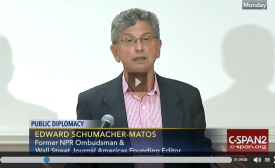cybersecurity
Cyber cooperation remains a prominent area of mutual interest between Singapore and Washington. Singapore’s Cyber Security Agency (CSA) and the US Department of Homeland Security recently established a formal cybersecurity partnership. This agreement will improve bilateral cybersecurity and potentially create mechanisms for ASEAN nations to better address cybersecurity challenges.

This new video from C-Span explores the "existential crisis" affecting news media outlets, governments and public diplomacy practitioners in the digital era, with a special hat tip to USC's exemplary public diplomacy programs.
The debate about diplomacy in the digital age has been recklessly profligate with terminology. Terms such as e-diplomacy, cyber diplomacy or digital diplomacy have been used almost interchangeably, with each author sticking to his/her favorite. This not only wastes three perfectly good terms where one could do (denying us the other two for other purposes). It also conceals considerable confusion about the relationship between diplomacy and the digital world.
The use of diplomacy in general and, in particular, to help create a global anti-terror coalition does not need to be demonstrated. Face-to-face diplomacy, at all levels, but above all in the Arab world, where personal relationships are culturally important is much less expensive than security operations, not to speak about the military ones, and it may substantially contribute to improve anti-terror cooperation.
NATO is putting on its most fearsome display of military might in over a decade [...] The war games, which took two years of planning, were rejiggered to add areas where many NATO officials say the alliance has been dangerously deficient, including defending against cyberattack and the use of social media to deceive public opinion.
Havana, Jun 7 (Prensa Latina) The International Conference New Scenarios of Political Communication in the Digital Sphere-2015 ends today after rich debates on cybersecurity, governance of Internet and the digital gap. Experts and official delegates of 34 countries of all continents attended this event sponsored by the Cuban Ministry of Foreign Relations and will listen today to a report from the Presidency of the event that resumes discussions at the meeting and give way to the closing ceremony.
In the past decade, the United States has accused China of all sorts of aggressive actions in cyberspace against American companies and government agencies. Most often, they involve theft of intellectual properties in high-tech industries. But the revelations by US National Security Agency leaker Edward Snowden about pervasive cybersurveillance and spying against both foreigners and American citizens completely knocked the wind out of Washington's diplomatic onslaught.
President Obama’s newly installed defense secretary, Ashton B. Carter, toured Silicon Valley last week to announce a new military strategy for computer conflict, starting the latest Pentagon effort to invest in promising start-ups and to meet with engineers whose talent he declared the Pentagon desperately needed in fending off the nation’s adversaries.







